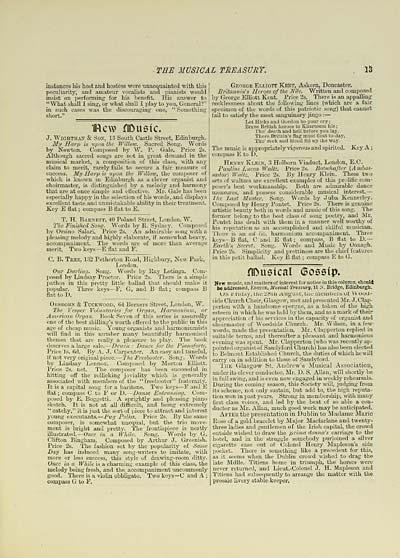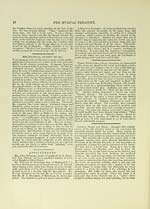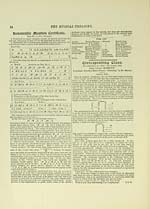Glen Collection of printed music > Printed music > Köhlers’ violin repository of dance music > Volume 1
(115) Page 13
Download files
Complete book:
Individual page:
Thumbnail gallery: Grid view | List view

^EE MUSICAL TREASVrT.
13
ibstances his host and hostess were unacquainted %vith this
peculiarity, and amateur vocalists and pianists would
insist on i^erforming for his benefit. His answer to
"What shall I sing, or what shall I play to you, General?"
in such cases was the discouraging one, " Something
short."
IRew flDusic.
J. WiGHTMAN" & Sou, 13 South Castle Street, Edinburgh.
Mil Harp is upon the WiUow. Sacred Song. Words
by Newton. Composed by W. P. Gale. Price 2s.
Although sacred songs are not in great demand in the
musical market, a composition of this class, with any
claim to merit, rarely fails to secure a fair measure of
success. Aly Harp is vpoii the Willow, the composer of
which is known in Edinburgh as a clever orsanist and
choirmaster, is distinguished by a melody and harmony
that are at once simple and effective. Mr. Gale has been
especially happy in the selection of his words, and displays
excellent taste and unmistakable ability in their treatment.
Key E flat ; compass B flat to E.
T. H. Barnbtt, 40 Poland Street, London, W.
The Finished Song. Words by R. Sydney. Composed
by Orsino Salari. Price 2s. An admirable song with a
pleasing melody and highly elaborate, if somewhat heavy,
accomijaniment. The words are of more than average
merit. Two keys — E flat and F.
C. B. Tree, 132 Petherton Koad, Highbury, New Park,
London.
Our Darling. Song. Words by Hay Lotinga. Com-
posed by Lindsay Proctor. Price 2s. There is a simple
pathos in this pretty little ballad that should make it
popular. Three keys — F, G, and B flat ; compass B
flat to D.
Orsborn & TocKWOOD, 64 Berners Street, London, W.
The Vesper Voluntaries for Organ, Harmonium, or
Ameriean Organ. Book Seven of this series is assuredly
one of the best shilling's worth offered to the public in this
age of cheap music. Young organists and harmoniumists
will find in this numljer many beautifully harmonised
themes that are really a pleasure to play. The book
deserves a large sale. — Drucie : Dance for the Pianoforte.
Price Is. 6d. By A. J. Carpenter. An easy and tuneful,
if not very original piece. — The Freebooter. Song. Words
by Lindsay Lennox. Composed by Morton Elliott.
Price 2s. net. The composer has been successful in
hitting off the rollicking joviality which is generally
associated with members of the "freebooter" fraternity.
It is a capital song for a baritone. Two keys — F and E
flat; comp>ass C to F or D. — Danse Entransim/. Com-
posed by E. Boggetti. A sprightly and pleasing piano
sketch. It is not at all difficult, and being extremely
" catchy," it is just the sort of piece to attract and interest
young executants.— Pw(7 Polka. Price 2s. By the same
composer, is somewhat unequal, but the trio move-
ment is bright and pretty. The frontispiece is neatly
illustrated.— Once in a While. Song. Words by G.
Clifton Bingham. Composed by Arthur J. Greenish.
Price 2s. The fashion set by the popularity of Same
Day has induced many song-wiiters to imitate, with
more or less success, this style of drawing-room ditty.
Onee in a While is a charming example of this class, the
melody being fresh, and the accompaniment uncommonly
good. There is a violin ohbligato. Two keys— C and A ;
compass G to F,
George Elliott KESt, Askern, Doncaster.
Britannia's Heroes of the Nile. Written and composed
by George Elliott Kent. Price 2s. There is an appalling
recklessness about the following lines (which are a fair
specimen of the words of this patriotic song) that cannot
fail to satisfy the most sanguinary jingo : —
Let Hicks and Goidon be your cry ;
Brave British heroes to Khartoum hie ;
Tho' death and hell before you lay.
There Br-itain's flag must float to-day,
Tho' reek and blood All up iha way.
The music is appropriately vigorous and spirited. Key A ;
compass E to 1).
Henry Klein, 3 Holborn Viaduct, London, E.G.
Pauline Lueca Waltz. Price 2s. Botsehafter (Ambas-
sador) Walts. Price 2s. By Henry Klein. These two
sets of waltzes are excellent examples of this prolific com-
poser's best workmanship. Both are admirable dance
measures, and possess considerable musical interest. —
the Last Muster. Song. Words by Juba Kennerley.
Composed by Henry Pontet. Price 2s. There is genuine
artistic beauty both in words and music of this song. The
former belong to the best class of song poetry, and Mr.
Pontet has dealt with them in a manner well worthy of
his reputation as an accomplished and sldlful musician.
There is an ad lid. harmonium accompaniment. Three
keys— B flat, C and B flat ; compass, B flat to D. —
Earth's Secret. Song. Words and Music by Oonagh.
Price 2s. Simplicity and prettiness are the chief features
in this petit ballad. Key B fl.at ; compass E to G.
flDu0ical (5o66ip,
New music, and matters of interest for notice in this column, shonld
be addreBBed. Ediiok, Musical Treasury, 11 ^. Bridge, Edinbtu-gh.
(J'H r iiday, tlie2Siu August, i no nicinbcis ul i\ oud-
side Church Choir, Glasgow, met and presented Mr. .T.Clap-
perton with a handsome epergne, as a token of the high
esteem in which he was held Ijy them, and as a mark of their
appreciation of his services in the capacity of organist and
choirmaster of Woodside Clmrch. Mr. Wilson, inafeW'
words, made the presentation. Mr. Clapperton replied in
suitable terms, and thereafter a pleasant and harmonious
evening Avas spent. Mr. Clapperton (who was recently ap-
pointed organist of Sandyf ord Church) has also been elected
to Belmont Estabhshed Church, the duties of which he will
carry on in addition to those of Sandyford.
The Glasgow St. Andrew's Musical Association,
under its clever conductor, Mr. D. S. Allan, will shortly be
in full swing, and is even now engaged in %veekly rehearsals.
During the coming season, this Society will, judging from
its scheme, not only sustain, but add to, the high reputa-
tion won in past years. Strong in membership, with many
first class voices, and led by the beat of so able a con-
ductor as Mr. Allan, much good work may be anticipated.
After the presentation in Dublin to Madame Marie
Rose of a gold bracelet by Major Macfarlane and twenty-
three ladies and gentlemen of the Irish capital, the crowd
outside wished to draw the prima donna's carriage to the
hotel, and in the struggle somebody purloined a silver
cigarette case out of Colonel Henry Mapleson's side
pocket. There is something hke a precedent for this,
as it seems when the Dublin crowd wished to drag the
late MdUe. Titiens home in triumph, the horses were
never returned, and Lieut.-Colonel J. H. Mapleson and
Titiens had subsequently to arrange the matter with the
l^rosaic Uvery stable-keeper.
13
ibstances his host and hostess were unacquainted %vith this
peculiarity, and amateur vocalists and pianists would
insist on i^erforming for his benefit. His answer to
"What shall I sing, or what shall I play to you, General?"
in such cases was the discouraging one, " Something
short."
IRew flDusic.
J. WiGHTMAN" & Sou, 13 South Castle Street, Edinburgh.
Mil Harp is upon the WiUow. Sacred Song. Words
by Newton. Composed by W. P. Gale. Price 2s.
Although sacred songs are not in great demand in the
musical market, a composition of this class, with any
claim to merit, rarely fails to secure a fair measure of
success. Aly Harp is vpoii the Willow, the composer of
which is known in Edinburgh as a clever orsanist and
choirmaster, is distinguished by a melody and harmony
that are at once simple and effective. Mr. Gale has been
especially happy in the selection of his words, and displays
excellent taste and unmistakable ability in their treatment.
Key E flat ; compass B flat to E.
T. H. Barnbtt, 40 Poland Street, London, W.
The Finished Song. Words by R. Sydney. Composed
by Orsino Salari. Price 2s. An admirable song with a
pleasing melody and highly elaborate, if somewhat heavy,
accomijaniment. The words are of more than average
merit. Two keys — E flat and F.
C. B. Tree, 132 Petherton Koad, Highbury, New Park,
London.
Our Darling. Song. Words by Hay Lotinga. Com-
posed by Lindsay Proctor. Price 2s. There is a simple
pathos in this pretty little ballad that should make it
popular. Three keys — F, G, and B flat ; compass B
flat to D.
Orsborn & TocKWOOD, 64 Berners Street, London, W.
The Vesper Voluntaries for Organ, Harmonium, or
Ameriean Organ. Book Seven of this series is assuredly
one of the best shilling's worth offered to the public in this
age of cheap music. Young organists and harmoniumists
will find in this numljer many beautifully harmonised
themes that are really a pleasure to play. The book
deserves a large sale. — Drucie : Dance for the Pianoforte.
Price Is. 6d. By A. J. Carpenter. An easy and tuneful,
if not very original piece. — The Freebooter. Song. Words
by Lindsay Lennox. Composed by Morton Elliott.
Price 2s. net. The composer has been successful in
hitting off the rollicking joviality which is generally
associated with members of the "freebooter" fraternity.
It is a capital song for a baritone. Two keys — F and E
flat; comp>ass C to F or D. — Danse Entransim/. Com-
posed by E. Boggetti. A sprightly and pleasing piano
sketch. It is not at all difficult, and being extremely
" catchy," it is just the sort of piece to attract and interest
young executants.— Pw(7 Polka. Price 2s. By the same
composer, is somewhat unequal, but the trio move-
ment is bright and pretty. The frontispiece is neatly
illustrated.— Once in a While. Song. Words by G.
Clifton Bingham. Composed by Arthur J. Greenish.
Price 2s. The fashion set by the popularity of Same
Day has induced many song-wiiters to imitate, with
more or less success, this style of drawing-room ditty.
Onee in a While is a charming example of this class, the
melody being fresh, and the accompaniment uncommonly
good. There is a violin ohbligato. Two keys— C and A ;
compass G to F,
George Elliott KESt, Askern, Doncaster.
Britannia's Heroes of the Nile. Written and composed
by George Elliott Kent. Price 2s. There is an appalling
recklessness about the following lines (which are a fair
specimen of the words of this patriotic song) that cannot
fail to satisfy the most sanguinary jingo : —
Let Hicks and Goidon be your cry ;
Brave British heroes to Khartoum hie ;
Tho' death and hell before you lay.
There Br-itain's flag must float to-day,
Tho' reek and blood All up iha way.
The music is appropriately vigorous and spirited. Key A ;
compass E to 1).
Henry Klein, 3 Holborn Viaduct, London, E.G.
Pauline Lueca Waltz. Price 2s. Botsehafter (Ambas-
sador) Walts. Price 2s. By Henry Klein. These two
sets of waltzes are excellent examples of this prolific com-
poser's best workmanship. Both are admirable dance
measures, and possess considerable musical interest. —
the Last Muster. Song. Words by Juba Kennerley.
Composed by Henry Pontet. Price 2s. There is genuine
artistic beauty both in words and music of this song. The
former belong to the best class of song poetry, and Mr.
Pontet has dealt with them in a manner well worthy of
his reputation as an accomplished and sldlful musician.
There is an ad lid. harmonium accompaniment. Three
keys— B flat, C and B flat ; compass, B flat to D. —
Earth's Secret. Song. Words and Music by Oonagh.
Price 2s. Simplicity and prettiness are the chief features
in this petit ballad. Key B fl.at ; compass E to G.
flDu0ical (5o66ip,
New music, and matters of interest for notice in this column, shonld
be addreBBed. Ediiok, Musical Treasury, 11 ^. Bridge, Edinbtu-gh.
(J'H r iiday, tlie2Siu August, i no nicinbcis ul i\ oud-
side Church Choir, Glasgow, met and presented Mr. .T.Clap-
perton with a handsome epergne, as a token of the high
esteem in which he was held Ijy them, and as a mark of their
appreciation of his services in the capacity of organist and
choirmaster of Woodside Clmrch. Mr. Wilson, inafeW'
words, made the presentation. Mr. Clapperton replied in
suitable terms, and thereafter a pleasant and harmonious
evening Avas spent. Mr. Clapperton (who was recently ap-
pointed organist of Sandyf ord Church) has also been elected
to Belmont Estabhshed Church, the duties of which he will
carry on in addition to those of Sandyford.
The Glasgow St. Andrew's Musical Association,
under its clever conductor, Mr. D. S. Allan, will shortly be
in full swing, and is even now engaged in %veekly rehearsals.
During the coming season, this Society will, judging from
its scheme, not only sustain, but add to, the high reputa-
tion won in past years. Strong in membership, with many
first class voices, and led by the beat of so able a con-
ductor as Mr. Allan, much good work may be anticipated.
After the presentation in Dublin to Madame Marie
Rose of a gold bracelet by Major Macfarlane and twenty-
three ladies and gentlemen of the Irish capital, the crowd
outside wished to draw the prima donna's carriage to the
hotel, and in the struggle somebody purloined a silver
cigarette case out of Colonel Henry Mapleson's side
pocket. There is something hke a precedent for this,
as it seems when the Dublin crowd wished to drag the
late MdUe. Titiens home in triumph, the horses were
never returned, and Lieut.-Colonel J. H. Mapleson and
Titiens had subsequently to arrange the matter with the
l^rosaic Uvery stable-keeper.
Set display mode to: Large image | Transcription
Images and transcriptions on this page, including medium image downloads, may be used under the Creative Commons Attribution 4.0 International Licence unless otherwise stated. ![]()
| Special collections of printed music > Glen Collection of printed music > Printed music > Köhlers’ violin repository of dance music > Volume 1 > (115) Page 13 |
|---|
| Permanent URL | https://digital.nls.uk/91451436 |
|---|
| Shelfmark | Glen.224 |
|---|---|
| Additional NLS resources: | |
| Attribution and copyright: |
|
| Description | Scottish songs and music of the 18th and early 19th centuries, including music for the Highland bagpipe. These are selected items from the collection of John Glen (1833 to 1904). Also includes a few manuscripts, some treatises, and other books on the subject. |
|---|
| Description | The Glen Collection and the Inglis Collection represent mainly 18th and 19th century Scottish music, including Scottish songs. The collections of Berlioz and Verdi collected by bibliographer Cecil Hopkinson contain contemporary and later editions of the works of the two composers Berlioz and Verdi. |
|---|

